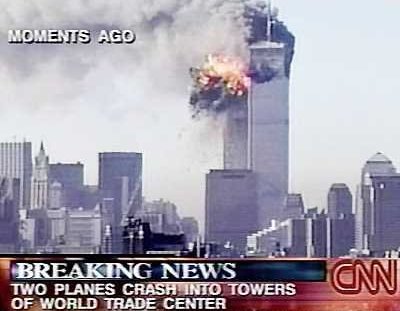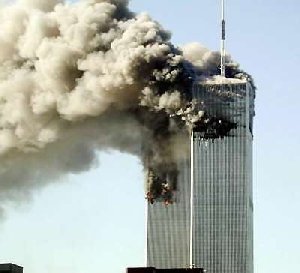
A GeoCities Featured Page



Photographs used here taken from The Age Gallery, September 12th., 2001
|
It may not be the end of the world, but I suspect that last week marked the end of communications as we know them.
I rang an old friend in New York late the other night. I rang because l had sent her an email several days before asking if she and her husband and all in their circle were OK, and hadn't gotten a reply. This nagging silence bothered me. No news was not good news. So I used the telephone.
Her husband answered. Yes, they were all fine. Then he got my friend, whom he said was on the other line.
She hadn't received my e-mail. In fact, she said, she had just been talking to the service provider trying to work out what was going on. They had recently changed to a higher-tech, faster system. One that seemed to have failed, possibly because of infrastructure destroyed in the World Trade Centre.
We chatted for a while The line was very clear. She described standing on the roof of their building in Brooklyn, using, using binoculars to watch the twin towers burning. She spoke of the horror of it, knowing how many people worked there. Then air force fighter jets overhead, which, along with the smoke on the skyline, suggested a city at war..
Life still wasn't back to normal. They had been planning to get their backyard fixed up this weekend but had put it off. It didn't seem important any more She said she was concerned about President Bush's talk of retaliation, but added that it difficult to voice such thoughts because of all the fear and anger around. .
We wished each other well and bung up. I thought about how things had changed. Once we exchanged letters.
More recently it has been the occasional e-mail. To use the phone in this cyber age seemed strangely old-fashioned. But it worked. We talked. The unease I had felt was eased. And the following day l got a normal e-mail. The system had been sorted out, she wrote. They were now back on line..
We have all read countless other e-mails over the past week.
There have been transcripts of other phonecalls.
Yesterday I learned about a different form of communication: a woman evacuating her building in lower Manhatton tapping out pager messages to her husband in New Jersey.
It may not be the end of the world, but I suspect that last week marked the end of communications as we know them. Suddenly we are in the age of the instant epitaph. Heart-breaking messages on telephone answering machines. Calls from a doomed aircraft. E-mails from smoke-filled offices.
Every conflict introduces a new element to our concept of war, which is how this has been described. Vietnam was the first TV war; from the Gulf came those surreal images of missiles going down chimneys; from the US, September 11,2OO1, we have immediate farewell messages..
So much has changed. In July,1861.during the US Civil War, Major Sullivan Ballou ended a letter home to his wife:
Today, people anticipating their own deaths as Ballou did, can make calls on mobile phones, type on pocket pagers, send e-maiis on laptop computers..
But when things go wrong, communications break down.
I sent an e-mail to an old friend and it didn't get through. So I made a phonecall.

|


 Please mail any comments and suggestions to:
robin_knight@bigfoot.com
Please mail any comments and suggestions to:
robin_knight@bigfoot.com